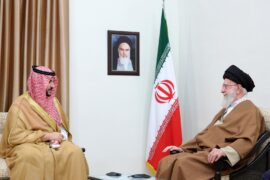Perhaps the most significant feature of Israel’s current election cycle has been the overt rise in popularity of controversial lawmaker Itamar Ben-Gvir (Otzma) and the hysterical scaremongering by many liberal Israelis and Diaspora Jews to what they see as the ascendence of Jewish ultra-nationalism enabled by former Prime Minister Binyamin Netanyahu (Likud).
But those frightened by the prospect of kahanism spreading and gaining legitimacy and closer proximity to power in Israel should understand that Ben-Gvir is actually not the primary threat they should be focused on.
Kahanism at its core is essentially Zionism for the Ḥaredi community. It’s the Ḥaredi worldview and approach to Torah mixed with a muscular nationalism (it should be noted that Rav Meir Kahane himself was a product of both the Ḥaredi Mir Yeshiva & Z’ev Jabotinsky’s rightist Betar youth movement). The growth of this aggressive nationalism in Israeli society – especially within Ḥaredi spaces – isn’t the product of one political figure or spiritual teacher but rather the result of material conditions and how the Israeli masses experience themselves in relation to the nation’s westernized ruling class, the Palestinians, and others they view as hostile.
With its high birthrates, the Ḥaredi sector comprises the fastest growing demographic between the river and the sea. The combination of this factor with astronomical unemployment figures sets a limit on how long this community can sustain itself economically without entering mainstream Israeli society. And once it does enter the army and workforce, and embraces the basic nationalist tenets of Israeli society – especially the brand of Jewish nationalism prevelent amongst Israel’s working poor, it will undoubtedly bring with it an upsurge of kahanism (or something kahanist adjacent) that will deeply impact the nation’s political landscape.
Many of the Israeli and Diaspora Jewish voices decrying Ben-Gvir’s meteoric rise in popularity often attempt to paint him – and kahanists more broadly – as Israel’s version of the European far right or America’s Ku Klux Klan. But these clumsy parallels only fit when Israel is contextualized as the Western nation these Jews so desperately want it to be. But when viewing Israel within the context of other Semitic societies in West Asia, one could employ a more nuanced and accurate appraisal of Ben-Gvir and his appeal to much of the Israeli public.
To properly analyze the dynamics of Israel’s political system, it’s important to recognize that Western political framings don’t fit our society. Liberal, conservative, left, right, religious and secular are all categories that developed in Europe and have deep roots in the West. They grew out of Greco-Roman civilization, Christian dogma and the revolutionary transition from feudalism to capitalism. Trying to impose such a framing on non-Western societies obviously leads to major errors in appraising those societies and their sociopolitical trajectories.
A better and more accurate way to understand Israeli society is through our ancient tribal identities. According to this mapping, the parties that are manifestations of the tribe of “Yosef” – from Meretz to Bayit Yehudi/Yamina – fit neatly onto the linear Western political spectrum from liberal to conservative. But several Knesset factions, including Ben-Gvir’s Otzma, exist far outside of that spectrum.
By seeing Israeli political factions as loosely representing sociocultural “tribes” in our society with unique aspirations, grievances and prioritizations of values, we enable ourselves to see past the sensationalist rhetoric, mudslinging and campaign commitments in order to better understand what actually drives our political figures and parties beneath the surface. Once we get a deeper sense of the tribes each political party represents, we should be able to discern new possibilities for what could be if certain societal shifts were to take place.
Itamar Ben-Gvir and his fellow kahanists should be seen as representing the tribe of “Shimon” – which views the world almost exclusively through the ideological lens of Jewish history, is willing to use force to promote Torah values and tends to disdain Jews perceived to be overly interested in what gentiles think of them.
According to most of the liberal Jewish voices outraged by Ben-Gvir’s sudden popularity, what they find most offensive in him is his positions on Palestinians. But kahanists are really no worse on Palestinian issues than the other sectors of Israeli society – most of whom relate to Palestinians as not only an unwanted population but also as part of a much larger enemy collective that has repeatedly attempted to destroy Israel. So what’s most problematic about Ben-Gvir is actually something he shares in common with most of his political opponents.
But unlike most Israeli parties, Ben-Gvir’s Otzma follows this perception of Palestinians to its logical conclusions. If Palestinians really were to be the spearhead of broader Arab efforts to annihilate Israel, kahanist policies might actually make sense.
What troubles Israel’s Zionist establishment is actually something deeper.
Ben-Gvir represents the phenomenon of Israel’s more tribalist and traditional forces gaining power at the expense of the state’s westernized ruling class. In Israel’s broader cultural conflict between westernization and Jewish identity, Ben-Gvir serves as a convenient scapegoat to delegitimize the Jews more deeply connected to our roots. Israel’s elites rarely miss an opportunity to use kahanists as an ugly caricature to delegitimize the entire camp seeking to strengthen the state’s Jewish character and maintain Israeli control of the West Bank.
Israel’s elites, inheritors of the Zionist leadership that founded the state and had gambled its survival on it being a valuable asset to Western powers, have in recent years begun to realize that everything they built might soon fall into the hands of “less enlightened” Jews with an entirely different vision for what Israel should become. Ben-Gvir and many other lawmakers on his list (some of whom openly call for challenging dominant Israeli institutions), represent everything they fear Israel could become if the trajectory of our national development continues on its current path.
Even if the issue really were to be about Ben-Gvir’s anti-Palestinian rhetoric, it’s important to understand that such rhetoric is only a surface issue – a symptom of a much deeper problem. The deeper issue that urgently needs tending is the way Israelis and Palestinians here psychologically experiences the Other – the problematic role Palestinians play in Israel’s broader national story, as well as the role we Israelis play in the Palestinian story.
When creatively addressing the roles we play in each others narratives, Ben-Gvir and his voters might actually be more part of the solution than the problem. The kahanists are deeply, albeit narrowly, connected to Jewish identity, and experience themselves living as characters in the same story as their Biblical ancestors. They relate to modern political issues through the lens of an exclusivist Jewish narrative. Their antagonism towards Palestinians, however, comes less from racism as it’s understood in the West and more from a contextualization of Palestinians as a population long at war with the people of Israel.
The deep tribalism and Biblical mentality of the kahanists is in many ways much closer to some of Israel’s neighbors than to the European-style nationalism of Israel’s westernized Yosef camp. Loyal to what they see as a tradition of Biblical Israelite heroes, kahanists might be more willing to use violence against anyone deemed an enemy of the Jewish people. But they are also capable of being critical of Israel’s colonial features, which they rightly view as assimilationist (and sometimes find themselves the victims of).
The relations between kahanists and Palestinians might actually be closer to that of two native tribes locked in conflict with one another than that of colonizer and colonized. Like the “hilltop youth” subculture, kahanists constitute an ideological group that has long felt alienated from – and often repressed by – the Israeli state. This could ultimately create space for a healthier relationship dynamic if only the two groups could stop viewing one another as the enemy.
While Ben-Gvir might represent an extreme expression of the deep Jewish nationalism that covertly drove the Zionist movement at its core, Defense Minister Benny Gantz (National Unity) and interim Prime Minister Yair Lapid (Yesh Atid) represent all the external husks of that movement in need being discarded, most notably its colonialist features, worship of military strength, desire for the “normalization” of Jews among nations (westernization) and the dehumanization of Palestinians as “lesser people.”
Yet it’s ironic that many of the very same alarmist Jewish voices hysterical over Ben-Gvir are also hypocritically promoting Gantz or Lapid in these elections. In addition to representing a military establishment and defense industry that sells arms to human rights abusers abroad, Gantz has casually bragged about the violence he’s inflicted on Palestinians. He relates to Palestinians not as an enemy tribe but as inferior humans he can wipe away with superior weapons.
Gantz, Lapid and the voters they represent essentially want Israel to exist as an outpost of Western civilization in an otherwise “savage” region – or a “villa in the jungle” as former Prime Minister Ehud Barak famously put it. The State of Israel envisioned by such leaders would exist as a perpetual American client state completely disconnected from its neighbors.
The Liberal Zionist vision for Israel could never successfully indigenize into the Semitic region, meaningfully change the role we play in the Palestinian story or alter the way most Israelis view Palestinians. Their ideal Israel would continue to see itself as dependent on Washington for its survival and would therefore remain trapped in the classic middle agent oppressor role thrust on the Jewish people by the global capitalist system.
It’s easy to criticize Ben-Gvir. Kahanists are low hanging fruit. But scapegoating him and his supporters prevents us from dealing with some very real problems in Israeli society – namely how we as a collective relate to Palestinians. The answer isn’t to silence and delegitimize anyone willing to advocate violent policies against a population nearly all of Israeli society views as unwanted antagonists, but rather to change the roles Palestinians and Israelis play in each other’s larger national stories.





